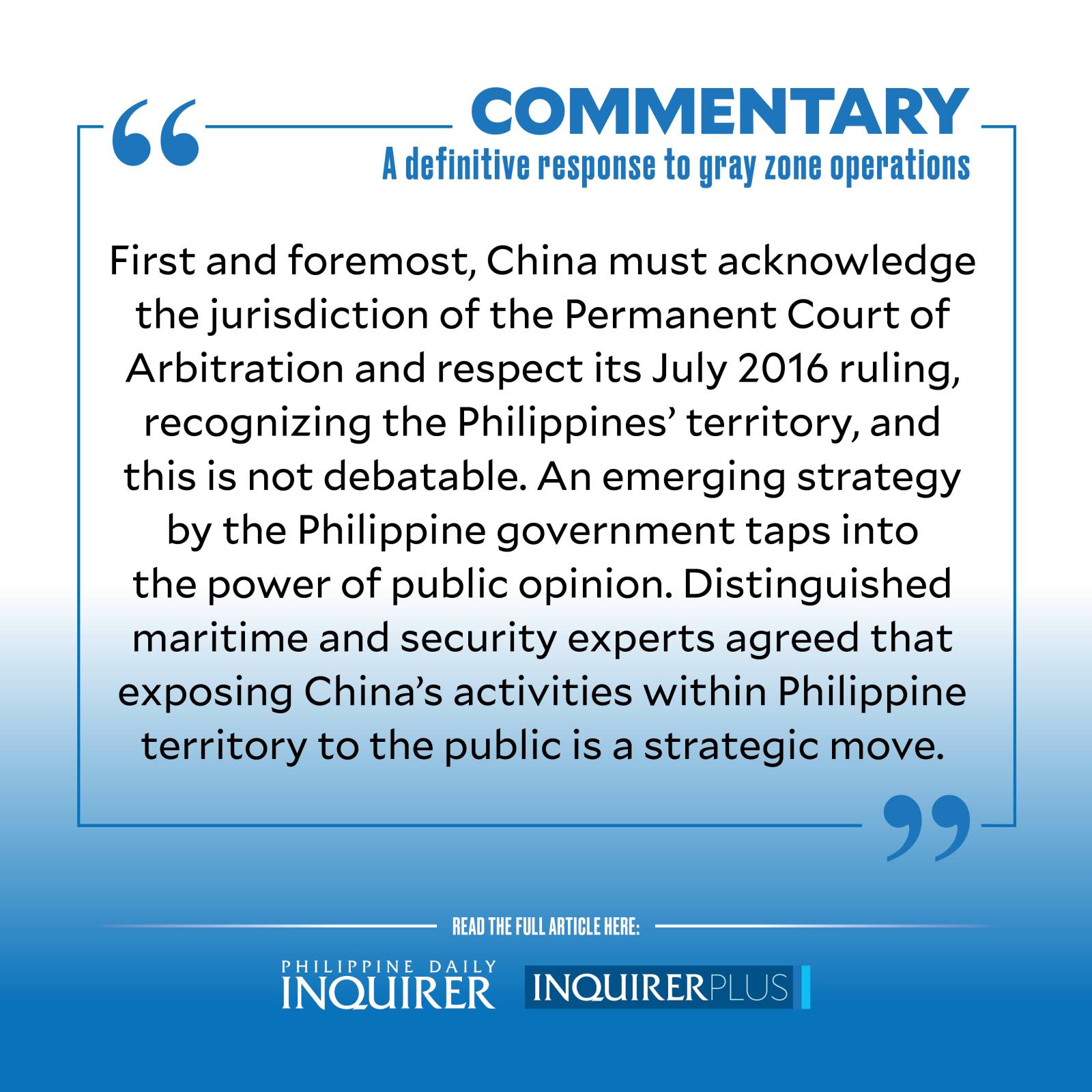A definitive response to gray zone operations

Gray zone activities are performed by states to assert their power and influence while remaining below the threshold of what could be considered acts of war. As it stands below the threshold of conflict, gray zone tactics challenge current policies and push states to realign strategies that can effectively counter these operations. Those on the receiving side of these aggressive acts must calibrate an appropriate, commensurate, and effective response that is cautiously complex.
The West Philippine Sea (WPS) has long been a ground for gray zone tactics whose ambiguity and threatening features undermine the established rules-based international order. Members of the international community remain firm in the belief that any attempts to challenge the status quo and disrupt this order cannot be tolerated.
Last month, a Chinese ship pointed a military-grade laser at the Philippine Coast Guard (PCG). Last week, more than 40 Chinese vessels were reported anchored within 4.5 miles to 8 miles off Pag-asa Island. Over the past years since the arbitral victory of the Philippines, China has demonstrated its aggressive actions repeatedly. It is constantly driven by its expansionist ambitions and militarization, which cannot continue. How should the Philippines respond to such persistent acts in the WPS?
During his term, President Rodrigo Duterte reduced the issue into a dichotomy, saying that the Philippines was too weak and would surely lose to China. He even set aside our victory at the Permanent Court of Arbitration. He mostly pursued a policy of appeasement, emboldening Beijing to further encroach into our territory and pillage our exclusive economic zone.
This policy of appeasement did not prevent China’s aggressive actions against the Philippines. During President Marcos Jr.’s visit to China, a direct communication mechanism between the two countries was proposed to address issues and incidents in the WPS. While others see this as a remarkable step in Philippine-China relations, the proposal does not contribute anything new to resolve existing issues. First and foremost, China must acknowledge the jurisdiction of the Permanent Court of Arbitration and respect its July 2016 ruling, recognizing the Philippines’ territory, and this is not debatable.
An emerging strategy by the Philippine government taps into the power of public opinion. Distinguished maritime and security experts agreed that exposing China’s activities within Philippine territory to the public is a strategic move.
According to Commodore Jay Tarriela, adviser to the commandant for maritime security and spokesperson for the PCG, exposing developments in the WPS opens public discourse and brings awareness to China’s bullying behavior. “The best way to address Chinese gray zone activities is to expose them. Let us not allow ourselves to suffer silently because of their harassments and hostile actions,” he said. He added that the Philippines could hold China accountable by making these actions available to the public. The PCG’s role is to remove shades of gray, expose what China is doing, and create public and global awareness about what is happening.
Retired Air Force Col. Raymond Powell of the Gordian Knot Center for National Security Innovation agreed on this strategy against gray zone operations. He asserted that “an engaged public is the key in an open society and in a democracy to making sure that the government has the political space to be able to push back against gray zone operations.”
By engaging the public, the Philippine government builds support from Filipinos. Over the long term, Powell argues, this can help deter gray zone activities in the WPS.
Aside from public engagement, cooperation with like-minded states such as the United States, Australia, Japan, and the European Union is an effective strategy to counter gray zone tactics. Initiatives such as joint patrols and maritime domain awareness must be continued, with almost 80 percent of Filipinos agreeing to strengthen the military capability of the Philippine Navy and the PCG as well as to conduct joint maritime patrols and military exercises with allied countries.
Moving forward, as new tactics will be used and security risks will evolve in the WPS, formulating a definitive response to gray zone operations is crucial. It requires an independent foreign policy that upholds the Filipinos’ national interests and emphasizes working with Indo-Pacific states. Defending the rules-based international order can only be achieved through cooperation, not coercion.
We look to our leaders to steer us in the right direction, and to get into alliances that would secure our sovereign rights as a free and peace-loving nation.
——————
Dindo Manhit is founder and CEO of the Stratbase Group.















